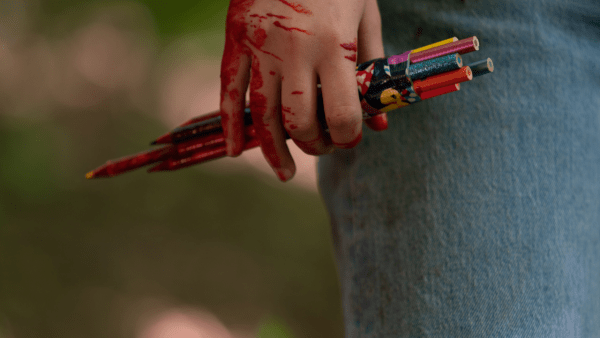
In He Said/She Said, critics Joe and Valeska dissect a film in a back and forth exchange. Previously, we took a well-needed, but ill-fated summer vacation in small-town Canada with the Pierce Brothers’ witchy teen terror The Wretched (2019).
This time, we’re heading back to cottage country to continue our examination of the worst summer vacations imaginable with Becky, directed by Jonathan Milott and Cary Murnion.
Spoilers follow…
Synopsis: A teenaged girl is forced to face the unhappy prospect of her father remarrying after the death of her mother, but she discovers that there are far worse things than a blended family when a menacing stranger appears at the door of her family’s cottage with a sinister mission — and only she holds the key to survival.
SHE SAID
In the time of Covid-19 and self-quarantine, it may not be a bad thing to have so many films available that illustrate the risks of travelling to cottage country (whether those risks be introducing the novel coronavirus to a low-risk area whose healthcare facilities are not equipped to handle higher rates of infection or a gang of Aryan Brotherhood thugs hellbent on locating their hidden treasure). While I’m aching to get out of the city for a weekend, our last couple of picks have let me live vicariously and given me a mild fear of scenic shores and bountiful foliage.
(Just kidding. I’d still kill for a road trip to Grand Bend right about now, if it didn’t carry the risk of actually killing anyone.)
So, Becky. A quick plot summary: our titular teenaged heroine (played by Lulu Wilson of Sharp Objects and The Haunting of Hill House) is still reeling from her mother’s death from cancer a year prior. We know immediately that she is troubled because she has one pale blue streak in her otherwise normal and ‘relatable’ blonde hair, a trope so overplayed and ridiculous that it was rightfully mocked on Community. Speaking of Community*, it was great to see Joel McHale in a dramatic role as Becky’s father, a man who is ready to move on and form a new family unit with his new girlfriend, Kayla (Orphan Black’s Amanda Brugel) and her son Ty (Isaiah Rockcliffe).
*McHale’s character is named Jeff, so this is clearly a postscript to Community. It was very interesting to see what happened to Jeff Winger after his teaching gig at Greendale Community College.

When Jeff tries to force a blended family vacation at the cottage that his late wife loved, Becky rebels, becoming even more agitated when he reveals his engagement to Kayla. Becky storms off into the woods just before a burly and intimidating man named Dominick (Kevin James) appears at the door, claiming to be looking for his lost dog (a Rottweiler, naturally). He may as well be claiming to be in need of several eggs because, like the clean-cut Peter and Paul from Michael Haneke’s Funny Games (1997 or 2007, take your pick), this is merely a ruse to gain entrance into the home. Once he makes it inside, our nightmare begins. In search of a key that unlocks a mysterious box stored in the basement of the cottage, Dominick and his Aryan Brothers will stop at nothing and do not shy away from inflicting incredible violence upon the beleaguered family to get it. Left to her own devices, it’s up to Becky to outsmart the Nazi scum and rescue the others.
First off, let’s talk about the good things that this film offers: Kevin James does a really decent job in his first dramatic performance, bringing an aura of menace to his cold and calculating gang leader. Lulu Wilson provides both the full force of Gen Z angst and a number of really great kills — if nothing else, the film is a potent showcase for entertaining, cathartic, and vividly realized gore (Becky’s first and final kills were particular favourites of mine). The score throughout was fantastic and the closing credit sequence was fire.
Ack, I’ve written so much! I’ll turn it over to you for now — did Becky’s blue streak of doom annoy you as much as it annoyed me? What did you think of the performances? And do you think that the Aryan Brotherhood angle added anything at all to the story, or did you find it to be a gratuitous add-on?
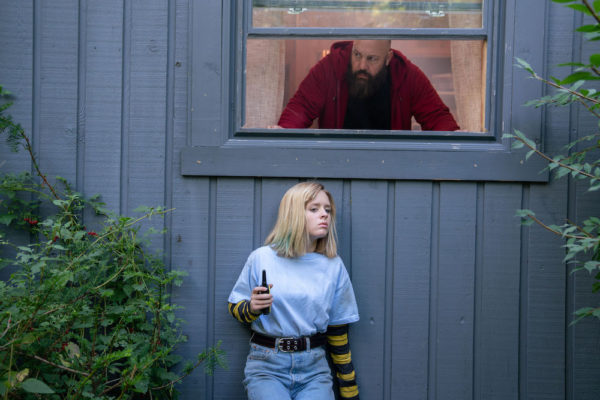
HE SAID
I’ll confess that as a boring blonde, the blue streak of rebellion in Becky’s hair didn’t annoy me as much as it bothered you. If anything I would have thought you’d find the blue appealing considering how often you’ve rocked a blue do in the years we’ve known each other. Isn’t Becky simply a younger, more physically violent manifestation of you?
Jokes aside, I’m pretty happy with Becky. This is a relatively bare bones plot, so there’s not much more to hang your hat on that the synopsis you outlined above, which means there also isn’t a ton of places to hide. It’s pretty straightforward fare, which means if something isn’t working, there are no distractions.
Thankfully, I think this is well-executed. McHale is fine as the sorta concerned father who also wants to move forward, and the film smartly raises the stakes by killing him off relatively early on. It’s not a surprise, but a lot of other films would keep their star around longer, or simply wound him, so I applaud screenwriters Nick Morris, Ruckus Skye and Lane Skye for not pulling punches.
And really, that’s an overall strength of the film. You mentioned Becky’s kills and they’re all pretty decent. It’s a fine balance between Home Alone style shenanigans and set-ups that a pre-teen girl could (mostly) conceivably execute with minimal time. The flying fox/art pencils/ruler death of Cole (Ryan MacDonald) in particular is great. Not only does it set the stage for what Becky can deliver, but it’s suitably messy and imperfect. And all of the kills in this film are: with the exception of Apex (Robert Mailet)’s gangland execution, none of these are “perfect movie kills”. The dock death of Hammond (James McDougall) stretched credibility the most, but it’s scrappy and Becky never walks away from these encounters unaffected, which I quite liked.
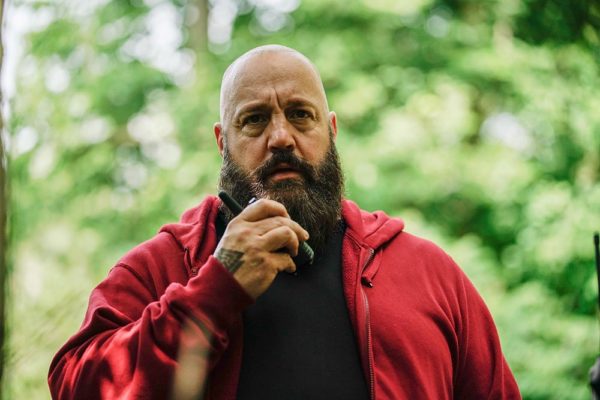
As for the Aryan thing…ultimately it doesn’t truly come to anything since narratively it could be eliminated so that it’s just a group of thugs in pursuit of “tresor” and the film would more or less play the same. BUT, there is an interesting angle around the concept of families – inherited and made. The entire opening of the film plays off of Becky’s inability to accept a new “made” family with Kayla and Ty, whereas Dominick’s authority over his underlings is entirely derived from their makeshift family as white supremacists. This is evident in his repeated conversations with Apex when Dominick refers to the towering giant as “my son”.
Sticking too close to one definition of family in this film will get you killed: Dominick relies on Apex to do his dirty work and killing kids eventually wears the man down to the point that he rebels against Dominick. Meanwhile Becky’s ability to see Ty and Kayla’s relationship in an equivalent light to the feelings she had for her mother allows her to become the avenging angel who saves the day. It’s just sad that it takes the death of her dad to make it happen.
V, who do you think of my family hypothesis? Is this film appropriately mean enough for you? Can we talk about the gore?! And what score do you award this Canadian-adjacent revenge film out of 10?
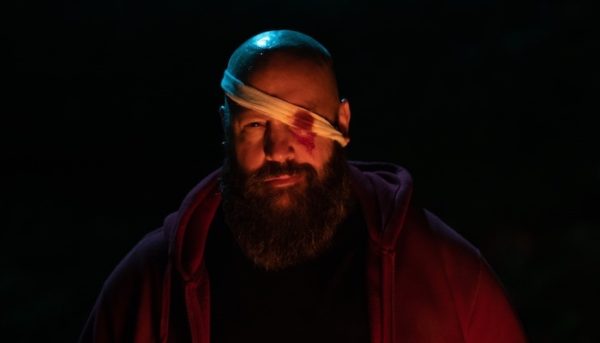
SHE SAID
I love your family hypothesis and, with that, I think that you made the Aryan Brotherhood angle gel a little better for me and actually improved my overall opinion of the film. Great analysis! And the blue-streak thing bothers me because of my experience with hair colour, not in spite of it — I think that filmmakers tend to restrict the “rebellious” hair colour to a single streak so that they can benefit from the visual cue while still coding their character as a mostly “normal” young woman (it is nearly always a young woman) who isn’t so counter-culture that she deserves what she gets. While things are changing, there is still a sizeable proportion of the older/more conservative population that conflates alt style with *gasp* drugs and “promiscuity,” which is terribly outdated.
If you’re going to have a blue-haired character, go all the way — and call me!
Home Alone is exactly what came to mind during Becky’s first kill — or, rather, 2018’s Knuckleball (another lone-child-takes-on-the-baddies romp). Becky is meaner than both, with the aforementioned death of father Jeff (just after his self-cauterizing stabbing by the fire — ooof, I winced so hard) really setting the tone for the violence to come. The film doesn’t hold back when it comes to gore, which I really appreciated.
I also loved the sharp mind of hopeful-step-mother Kayla, who used her wits multiple times to distract or trick the gang members. Between her strong misdirection skills and Becky’s raw aptitude for guerilla warfare, they could have been the family that you just don’t mess with. Unfortunately, with the loss of Jeff, Becky’s future remains unclear at the close of the film. Perhaps a La Femme Nikita (1990) style sequel in which Becky hones her assassination skills and works through her trauma could be interesting?
I give Becky a 7/10. What say you, Joe? Will you match or exceed my score? How did you feel about the treasure box MacGuffin? And would you be on-board with watching Becky further develop those killer instincts?
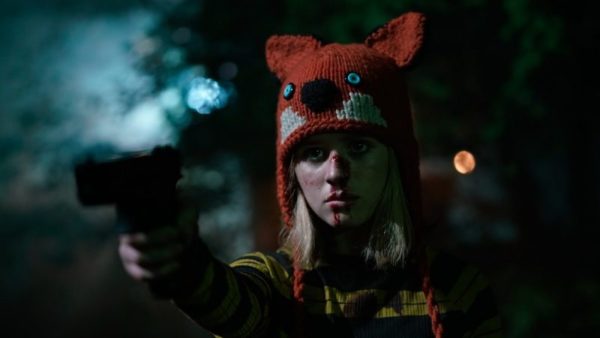
HE SAID
Oh, I’m so glad that you mentioned Knuckleball because I kept thinking of it, too. Sidebar: everyone seek out Knuckleball, it’s great!
I would definitely be up for a Hanna-esque sequel as Becky learns the tricks of the assassination trade. There’s something incredibly compelling about this character, though I’ll confess most of the credit goes to Lulu Wilson’s performance over the actual writing. Becky should be the kind of grating child character, but Wilson’s likeability turns her into more of a frustrated loner.
One of the other intriguing elements that we’ve not touched on is the duality between Becky and Dominick. The most obvious example is how they are positioned immediately before that aforementioned wince-inducing impalement scene, as the camera repeatedly pans back and forth between their walkie-talkie conversation in increasing close-up. But even before that, in the opening scene, the violence that Dominick observes in prison is visually matched by the fight Becky observes at school and even their respective trips on the highway (him in a prison transport; her in the family SUV) matches them accordingly. It’s a simple, but effective visual shorthand to establish their adversarial relationship, but it also subtly infers that they’re not so dissimilar. Consider how angry both of them get when they don’t get their way.
As for the MacGuffin? Ugh…I’ll confess that I couldn’t be less interested. I appreciate implicitly that Becky isn’t *actually* about the contents of the treasure box (it’s merely a means to an ends to force these two distinct groups of people into conflict), but it also reinforces a certain hollowness at the core of the film. Just like the Aryan Brotherhood element, this is a plot point that could have been easily wiped away without losing anything. Considering how comfortable the film is with hitting and even killing children, it’s curiously afraid to simply let Dominick and his crew just be bad. You mentioned Funny Games off the top and I can’t be wonder how much more threatening this film would be if it had adopted that (or The Strangers) mentality of criminals who imprison, murder and threaten simply because they can.
Alas, that’s not what we get. And ultimately that’s ok. Becky is a lean, mean affair and I found its mix of solid acting, good direction and surprisingly graphic gore to be a pleasant diversion. This isn’t a film that’s breaking the mould, but it’s eminently watchable. For that, it’s an 8/10 for me.